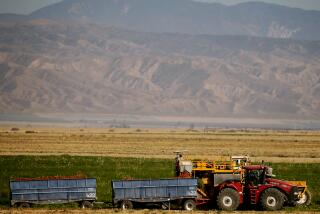Voters Reject Water Subsidy for Farmers
- Share via
CAMARILLO — Residents voted their pocketbooks Wednesday and rejected continuing water subsidies that would help keep 17 local farmers afloat.
The vote to subsidize agricultural water rates was narrowly rejected, with about 52% of 3,520 ballots cast against it.
Camarillo water customers will enjoy a savings of 30 to 90 cents on their monthly bill--or about $4 to $10 a year.
The farmers losing the subsidy, on the other hand, will see a 36% rate increase on next month’s bill, adding thousands to their costs and making Camarillo’s one of the highest agricultural water rates in the county.
“It’s going to be really tough to make that farm ground farmable,” said Keith Ford, who leases 46 acres in Camarillo.
The cost for Ford to prepare his land for planting now runs $4,500. That will go up to $6,150.
“Obviously, the city of Camarillo doesn’t care whether we farm or whether we don’t,” said Ford, general partner in Emerald Mist Berry Farms.
Some farmers noted the irony that thousands of Camarillo residents signed petitions for an initiative preserving farmland--a measure facing voters in November--but would not vote to help the farmers who rely on city water.
“You can’t just stop at the SOAR initiative,” said farmer Ann Stein, referring to the Save Open Space and Agricultural Resources measure. “Land is disappearing; you’ve got to do something to preserve land for farmers to grow on. Otherwise, how much do you want to pay for food?
“Do you want to pay a dollar an ear for corn? People are not going to want to do that. People don’t understand the cycles and the consequences.”
Some residents who voted against the water rate subsidy said it’s an economic issue.
“The homeowners’ water bills are high enough and we are on a fixed income,” said Julia Kressin, a 28-year resident who voted against the subsidy. “Anyway, the farmers are being pushed out [of their land] right and left.”
This isn’t the first time that a subsidy has gone before a vote of the people of Camarillo. Last year, residents overwhelmingly voted to support a continued subsidy on low-income senior citizens.
“People more than likely are making a distinction between people in the business of agriculture and senior citizens,” said Bob Westdyke, director of public services for Camarillo.
But some farmers are saying that without help, the rate increase may cause them to farm elsewhere.
Stein, part owner of Scarborough Farms, grows baby lettuce, which needs to be watered every day. Her water bill is $3,300 a month for a 20-acre parcel in Camarillo. That will rise to $4,500 a month with the rate increase and loss of the subsidy.
“We are already paying incredibly high rates as it is,” Stein said. “What it will do is it will make us unable to compete, because other farmers don’t have the same costs. It may be that we will have to farm somewhere else where water is cheaper.”
In retrospect, Westdyke said that perhaps farmers did not publicly voice their concern enough over how badly the lack of subsidies would affect their business.
“That might have been what tipped the scales to the other side,” he said.
Of the four agencies that provide water to Camarillo-area farmers, the city charges the most to deliver water to agricultural land, because many water facilities delivering low-cost water to farmers are giving them untreated water.
Camarillo does not have that ability, so it delivers more costly, potable chlorinated water to farmers, even though they don’t need it.
Farmers currently pay 84 cents per 100 cubic feet for city water, compared to the nearby CamRosa Water District, which charges 10% less, Westdyke said.
Some residents who supported the subsidies acknowledged the problems farmers face.
“I would like to see farmers stick around for a while. Anything we can do to keep them here for a while, I’ll do,” said Chris Weiland, a four-year resident who voted to continue subsidies.
“They’re not doing so well lately,” said Ike Edie, a 24-year resident who works with farmers drawing water wells. “They have enough restrictions with environmental and other things. I think it’s a really small thing to do for them.”
More to Read
Sign up for Essential California
The most important California stories and recommendations in your inbox every morning.
You may occasionally receive promotional content from the Los Angeles Times.










